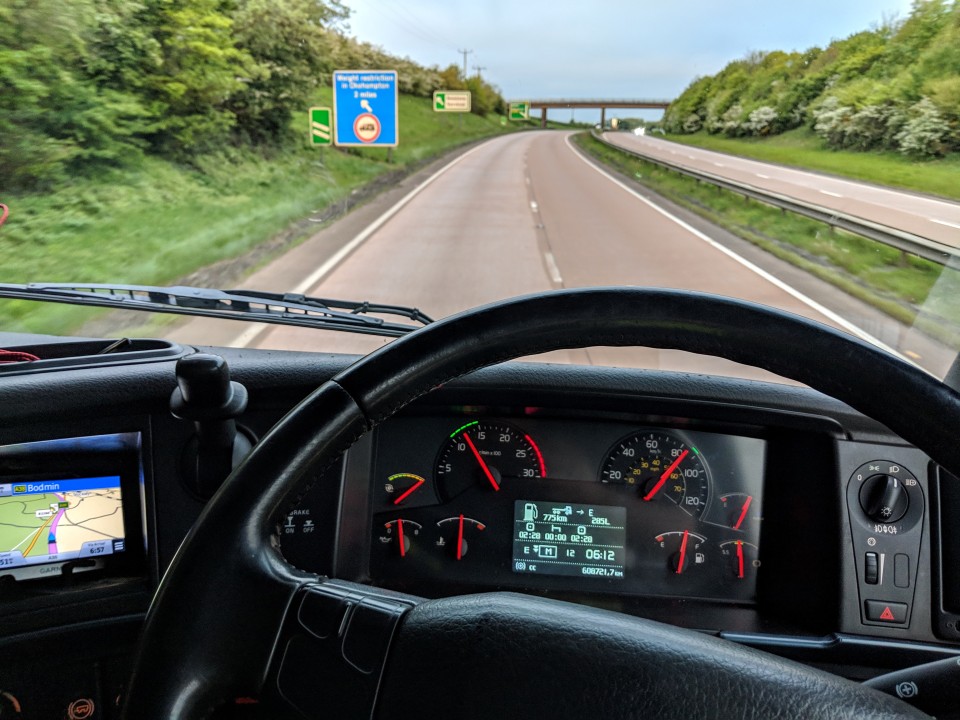
Susie Jones
Jak být zdravým řidičem kamionu
Vytvořeno: 27.08.2024
•
Aktualizováno: 27.08.2024
Řízení nákladních vozidel je náročné povolání, které často zahrnuje dlouhou pracovní dobu, sedavý způsob života a delší pobyt mimo domov, což se často podepisuje na zdraví mnoha řidičů.
Nezdravé návyky, jako je konzumace rychlého občerstvení, nedostatek fyzické aktivity a poruchy spánku, mohou v budoucnu vést k možným zdravotním komplikacím. Jak si ale jako řidič kamionu udržet dobrou kondici? Snadněji se to řekne, než udělá, ale sestavili jsme pro vás seznam tipů, které vám pomohou udržet se na cestách v co nejlepší kondici.
Šest nejlepších tipů, jak zůstat zdravý na cestách
1.Hydratace
Jednoduchá rada a zboží, které často považujeme za samozřejmost, nicméně většina zdravotních problémů vzniká v důsledku dehydratace. Pravidelné doušky vody nebo squashe během dne vyloučí z vašeho organismu metabolické odpady a toxiny a udrží vás energičtější a čipernější. Mít u sebe plnitelnou láhev s vodou vám nejen připomene, že máte zůstat hydratovaní, ale je to také lepší pro životní prostředí.
2.Strava
Po dlouhém dni nás všechny láká jídlo z fast foodu, ale stejně jako hydratace hraje i strava významnou roli pro vaše zdraví a pro to, jak se budete během dne cítit.
Řidičům nákladních vozidel se doporučuje jíst třikrát až čtyřikrát denně, a to buď dvě jídla a dvě svačiny, nebo dvě jídla a jednu svačinu. Snažte se dodržovat plán jídel a svačin s vysokým obsahem omega-3, železa a vitaminu C, například zelené listové zeleniny, ryb a ovoce. Vyhýbejte se časté konzumaci potravin a nápojů, jako jsou těstoviny, chléb, sladké nápoje a povzbuzující látky, například káva a energetické nápoje.
Podívejte se na náš seznam zdravých svačin, které můžete mít v kabině:
Granolové tyčinky
Energetické tyčinky
Popcorn
Ořechy
Sušené ovoce
Hořká čokoláda
Kromě nákupu zdravých potravin na cestách může být někdy zdravější a ekonomičtější připravit si jídlo. Frieghtech nabízí fantastický výběr receptů, které vám pomohou udržet zdravou stravu na cestách.
3.Spánek
Dostatek spánku může být pro řidiče nákladních vozidel vzhledem k povaze práce obtížné a může mít katastrofální následky pro všechny účastníky silničního provozu.
Jednoduché tipy a triky, jako jsou následující, vám mohou pomoci s pořádným spánkem:
Vytvořte v kabině prostředí, které vám bude připadat jako doma. Podívejte se na náš příspěvek o tom, jak z kabiny nákladního vozu udělat domov.
Udržujte prostor pro spaní tmavý
Horká sprcha: Použijte naši stránku mapy a zjistěte, která zastávka pro kamiony tuto možnost nabízí.
Vyzkoušejte některé aplikace, které vám pomohou se spánkem
Najděte si ideální místo k parkování, které nebude působit hluk a rušit. Naše aplikace intruck nabízí 5 000 míst pro těžká nákladní vozidla po celé Evropě, ze kterých si můžete vybrat, zatímco náš tým SNAP Access and Security vám může poskytnout bezpečnostní řešení na míru, která vám umožní lépe spát s vědomím, že jste vy i váš kamion v bezpečí.
4.Cvičení
Jeden z nejtěžších tipů, který je třeba dodržovat na cestách, ale přesto je důležitý. Dlouhé hodiny sezení během dne mohou vést ke špatnému držení těla, bolestem zad a možným zdravotním komplikacím. Po dlouhém dni za volantem může být lákavé sedět a odpočívat, nicméně rychlá patnáctiminutová aktivita, jako je chůze nebo protažení, vám může dodat pocit omlazení a menšího stresu.
HMD Trucking obsahuje několik užitečných cvičení přizpůsobených pro řidiče nákladních vozidel, pokud chcete do svého programu zařadit několik druhů fyzického cvičení.
5.Vitamíny
Když jste na cestách na plný úvazek, může být obtížné získat všechny potřebné vitamíny. Každodenní užívání multivitamínů může posílit váš imunitní systém a pomoci vám zůstat zdraví.
6.Duševní zdraví
Víme, že péče o fyzické zdraví na cestách je důležitá, ale kolik času věnují řidiči kamionů péči o své duševní zdraví?

Charitativní organizace pro duševní zdraví Mind zveřejnila statistiky, podle kterých je 30 % nemocí souvisejících s prací, které si zaměstnanci v dopravě a logistice sami hlásí, způsobeno úzkostí, osamělostí, stresem a depresí. Naznačila také, že toto číslo může být vyšší, protože většina lidí nevyhledá potřebnou pomoc. Kromě toho 95 % lidí v pracovní neschopnosti neuvede skutečný důvod své nepřítomnosti v práci, pokud se týká jejich duševního zdraví.
Dodržování výše uvedených tipů a triků může mít pozitivní vliv na vaše duševní zdraví. Kromě toho je důležité vést otevřené a upřímné rozhovory s ostatními řidiči kamionů, nadřízenými nebo dispečery.
Může z vás cvičení udělat lepšího řidiče?
Zdravý životní styl vede nejen k lepšímu duševnímu zdraví, ale také k tomu, že se díky němu můžete stát lepším řidičem. Studie ukázala, že řidiči, kteří byli požádáni, aby denně cvičili, uváděli větší lehkost při otáčení hlavy, byli schopni dále otáčet tělem a dokázali rychleji nasednout do auta.
Co je na práci řidiče kamionu nejtěžší?
Dlouhá pracovní doba se zdá být jedním z nejtěžších aspektů řízení kamionu. Řidiči kamionů se často potýkají s dlouhými kilometry, které musí ujet, a s antisociálními hodinami. Tyto dlouhé kilometry a nespolečenské hodiny mohou vést k nezdravému životnímu stylu.

Jak nezdravé je být řidičem kamionu?
Vzhledem k životnímu stylu mnoha řidičů kamionů je v průměru statisticky vyšší pravděpodobnost, že budou mít zdravotní problémy ve srovnání s lidmi v jiných profesích. Řidiči kamionů se často potýkají s několika překážkami, jako jsou stísněné pracovní prostory, stresové situace, neobvyklý spánkový režim a nedostatek výživných potravin, které mají vliv na jejich zdraví.
Udržování zdravého životního stylu řidiče nákladního vozidla vyžaduje vědomé úsilí, ale jeho přínosy se vyplatí. Výše uvedené tipy vám umožní převzít kontrolu nad svým zdravím a zlepšit svou pohodu. Sledujte další tipy a triky od nás ze společnosti SNAP.



